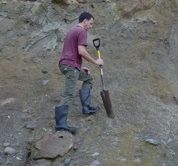Daniel Harris
Adjunct Instructor, Environmental Studies

- daniel.harris@mcla.edu
- Phone
- (413) 662-5481
- Office
- Center for Science & Innovation
Education
M.S. Soil Science, University of Massachusetts-
Amherst
B.A. Environmental Studies, MCLA
Courses Taught
ENVI-330 Introduction to Soil Science
Teaching
My goal is to provide students with a bridge linking the theoretical with the practical. In my view, the most effective and inspiring learning experiences in soil science, sustainable agriculture, and earth-surface processes are informed by the academic literature, and experienced in the field. The incredible and diverse array of soils and glacial-age landforms in the Berkshires makes field work here an enjoyable and fascinating pursuit! I aim to provoke imagination and curiosity in students, and to communicate the truly diverse and broad application of soil science.
Research/Creative Interests
As a scientist employed in the environmental consulting field for over a decade, I try to integrate my professional experience with my teaching for students entering fields related to environmental studies, earth science, and beyond. For example, awareness of the problem of deteriorating drinking water resources is incomplete without understanding the means by which drinking water is sourced, purified, and cycled. Contaminated sites cannot be effectively assessed and remediated without an understanding of the underlying soils, geologic structures, and groundwater characteristics inherent to the area. Agricultural productivity can co-exist with minimal harm and even benefit to natural systems, but only when practices are designed for and appropriate to the soil conditions of that particular place.
I am interested in exploring and describing surface and sub-surface conditions that, if interpreted correctly, reveal the mechanisms, magnitude, and chronology of events from the recent geologic past (<200 kya). Beginning with the advance of the Laurentide Continental Ice Sheet during the last major glaciation in New England, our region experienced environmental change on a massive scale. From the scouring of soils and sediments from the land surface to extinction-level events for megafauna, the story of our recent geologic past is still unfolding. In other words, the story is not settled, scientific interpretations are evolving, and the next generation of qualified scientists is vitally important to furthering the narrative.
I also try to lead by example through place of stones, the northern Berkshire homestead my wife Steph and I are working to establish. We use principles of permaculture to enhance habitat and biodiversity, build a healthy soil food web, increase resilience to climate variability, and limit outside inputs as much as possible.
